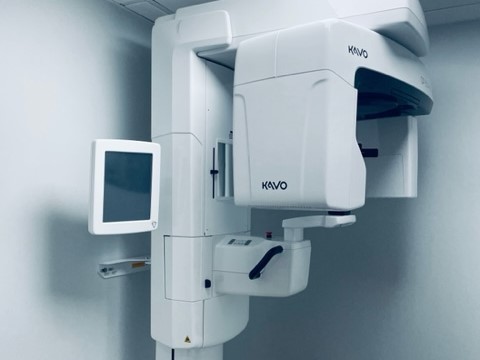Root Canal vs. Dental Implants
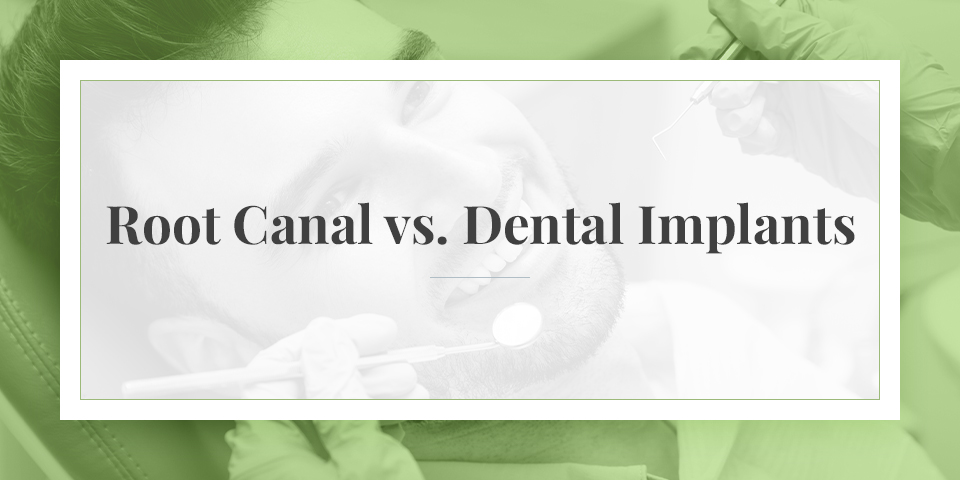
When a tooth’s nerves and pulp become infected, there are often two choices: extract the tooth or save the tooth with a root canal. This decision is multifaceted and depends on a variety of factors — whether there is an infection in the surrounding bone, the presence of gum disease, the strength of the supporting bone, and the condition of the remaining tooth structure.
What Is a Root Canal?
A root canal is a treatment used to save a tooth that has become infected. During a root canal operation, a dentist or endodontist removes the pulp and nerve, then cleans and seals the inside of the severely decayed tooth.
To finish the root canal process, a dentist will fill your tooth with a filling or crown, ensuring a natural appearance and adequate chewing ability.
If your tooth has become infected or injured, ask an endodontist or root canal specialist if you can save the natural tooth with a root canal. It’s always best to try to save your natural teeth before considering extraction, as implants, dentures, and bridges will not look, function, or feel exactly like your natural teeth.
What Are Dental Implants?
Dental implants are a form of teeth extraction that enable you to chew properly and keep other teeth in place. During a dental implant, your dental implant dentist or endodontist will extract the infected tooth and use an implant to replace the hole with an artificial tooth. The treatment process involves replacing the decayed tooth with a titanium implant — a surgical procedure in which the implant is inserted into the jawbone. Next, a crown is inserted into the implant on the first or second appointment.
Root Canal vs. Dental Implants: Pros and Cons
If you have a painful, diseased tooth, then it might be possible to get either a root canal or an implant to correct the problem. If your dentist or endodontist gives you the option of having either procedure, it’s important to understand how much they differ and what the advantages and disadvantages of each are.
As you decide on the best possible treatment for your smile, consider the following pros and cons, including important factors like the cost of root canals vs. implants.
Below are factors regarding these procedures that many patients want to know more about before they make a decision. When deciding between a root canal and dental implant, consider the following:
Success Rate
Dental implants are extremely successful, with about a 1% risk of infection after placement. Although still highly successful, root canals do not have as high success rates as implants. At times, root canals must be redone 5-10 years after the initial procedure.
Patients sometimes select implants because of their reputation for permanence, although getting the implant installed is a longer, more complex process than getting a root canal.
Cost
Because dental implants require surgery, they are more expensive than root canals. Root canals typically cost anywhere from $700 to $1,500 per tooth, and dental implants can range from $3,000 to $5,000. Many patients lack coverage for dental insurance, making a root canal the more financially accessible choice.
Time Frame
Root canals generally require one to three visits to an endodontist’s office. A dental implant can take anywhere from five months to a year for the process to be completed. Due to the lengthier time frame that getting an implant often requires, some patients opt to have a root canal instead to spend less time in the office and recovering.
If you want to get the procedure over with quickly, a root canal is usually the ideal solution.
Level of Invasiveness
A root canal procedure is less invasive than a dental implant and preserves your natural tooth. A dental implant is a replacement for your tooth that requires removing any remaining tissue and inserting an anchor point for the implant to attach to. Patients who decide to have a root canal procedure may want to avoid having to get a natural tooth pulled or feel more comfortable with keeping the natural tooth.
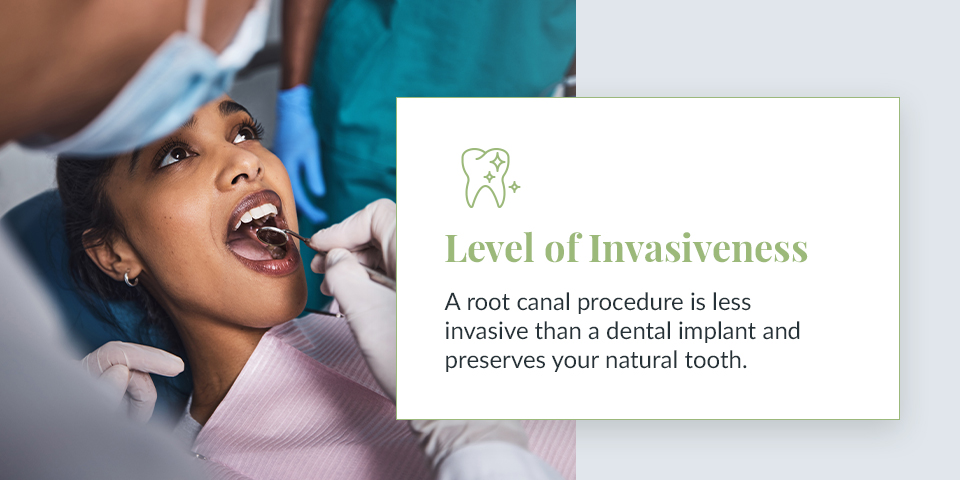
Your dentist can help you choose the best treatment option for your case. Some patients might be a better candidate for a root canal or a dental implant, but these procedures are sometimes interchangeable. Below is more detailed information regarding the specific pros and cons of root canals vs. implants:
Root Canal Pros
The many benefits of this procedure are more specifically that it is:
- Comfortable and pain-free: The anesthesia and techniques used during a root canal minimize your pain.
- Cost-effective: This is an affordable option for treating a diseased tooth.
- Requires fewer follow-up procedures: You can have a root canal treatment in a single visit, but a tooth extraction requires multiple steps over the course of several visits, including the installation of a replacement for your extracted tooth.
- Maintains the alignment: Your teeth stay in place when you have a root canal to correct a problem with the natural tooth, preventing future malocclusion or bite issues.
- Offers an appealing result: The crown your general dentist or endodontist installs during a root canal looks and functions just like your real tooth. The addition of a crown restores your tooth to a healthy state without sacrificing the original tooth.
Root Canal Cons
The benefits of a root canal come with a few cons, including how it:
- Weakens the structure: Although the procedure alleviates your tooth of disease and allows you to keep your natural tooth, getting a root canal without the addition of a crown often results in a weaker tooth with an altered structure. This could make your tooth prone to brittleness or cracks later. Getting a crown after your root canal seals off the inside of the tooth and ensures that it stays in a good condition.
- Could require multiple visits: In complicated or severe cases, you might have to return for more than one appointment, but many root canals are performed in a single office visit. Upper first molars are a little more complicated to treat than most of the rest of your teeth, for example.
- Has a risk of infection: In rare cases, you could get an infection after your root canal procedure. This is why it’s important to follow all aftercare instructions.
Dental Implant Pros
The pros of getting a dental implant include:
- High functionality: A dental implant looks like your natural tooth and functions just as effectively when chewing or biting food.
- Lower probability of bone loss: Getting an implant helps prevent your jaw bone from deteriorating due to the absence of a missing tooth.
- Lower risks of gum disease: After you replace your missing tooth with an implant, your risk of gum disease decreases.
- Maintains the alignment: Like a root canal, having an implant inserted can help your teeth stay in position, whereas a gap left by a missing tooth can cause the neighboring teeth to gradually slide out of their current positions.
Dental Implant Cons
The cons include:
- You must be an ideal candidate: Some patients qualify for a dental implant whereas others lack the necessary criteria, making the procedure riskier and less desirable to perform.
- The procedure takes longer: Getting an implant requires having a tooth extraction and later being fitted with a custom implant that matches the rest of your teeth. This process is typically longer than getting a root canal.
- Recovery takes longer: The average patient could spend as early as six weeks recovering from a dental implant procedure, but the process could take much longer depending on how far apart your appointments are.
- They are more expensive: In comparison to getting a root canal, a dental implant is a more expensive option.
Schedule Your Root Canal Appointment With Midtown Endodontist NYC Today

If you need to decide between a root canal vs. an implant, talk with a specialist about the pros and cons of each procedure. At Midtown Endodontist NYC, our caring and knowledgeable staff are committed to understanding and meeting all your dental needs. We provide complete, coordinated endodontic care and offer free consultations for all aspects of endodontics.
Book your appointment today with our top-rated endodontist by calling (347) 708-8795.
 Our Providers
Our Providers
 Blog
Blog
 Contact us
Contact us
 Endodontics
Endodontics
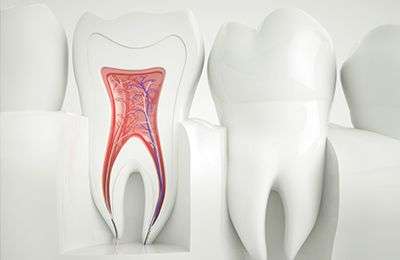 Root Canal Treatment
Root Canal Treatment
 Emergency Root Canal
Emergency Root Canal
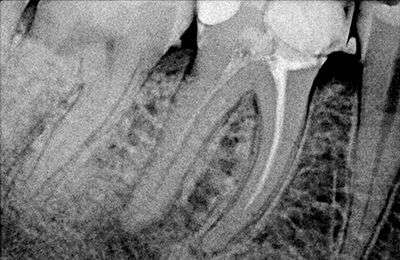 Root Canal Retreatment
Root Canal Retreatment
 Complimentary Teeth Whitening
Complimentary Teeth Whitening
 Teeth Whitening
Teeth Whitening
